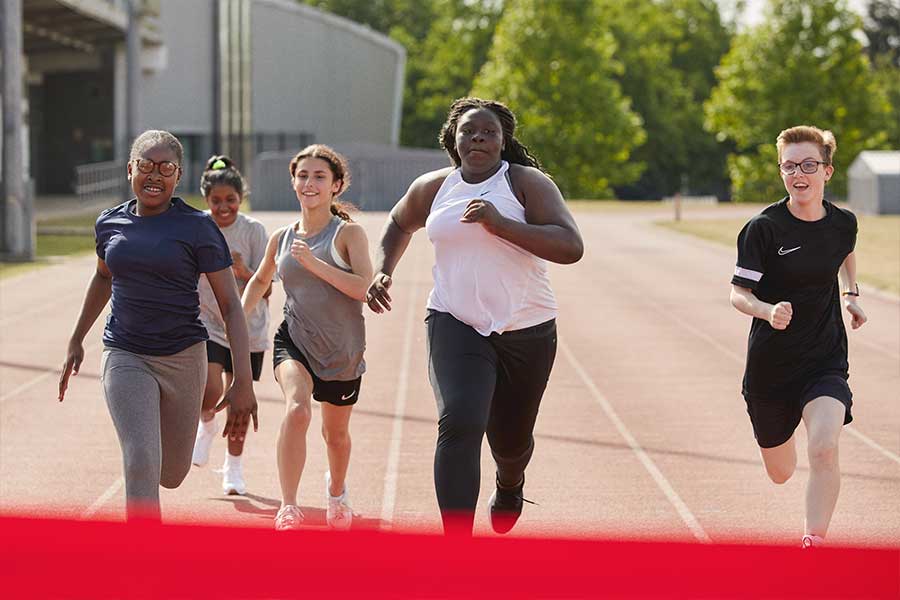
Since its inception 30 years ago, the U of M’s Tucker Center for Research on Girls & Women in Sport has been at the forefront of efforts to accelerate change for girls and women in sport and physical activity. The center has addressed issues of inequality between genders, including media coverage of sports teams and the disproportionately low number of women coaches at Division I colleges.
It's no surprise, then, that the Tucker Center would hone in on an alarming reality: Research shows that when girls partake in sport, they often drop out before they’re able to fully reap its many benefits. Globally, teenage girls drop out of sport at twice the rate of boys, and low body confidence is said to be the number one reason why.
So, for the past three years the Tucker Center team has collaborated with the Centre for Appearance Research (international experts on body image and appearance research) and corporate partners Nike and Dove to develop the new Body Confident Sport initiative. It’s a first-of-its-kind set of coaching tools designed to build body confidence in 11- to 17-year-old girls, as well as individuals across the full gender spectrum. (The program dovetails with Coaching HER, the product of a partnership with the Tucker Center and Nike.)
Body Confident Sport couples education for coaches with easy-to-use curriculum and guides so that coaches have the tools—and the inspiration—to help build body-confident athletes.
The curriculum was co-created with girls and coaches in six countries, including France, India, Japan, Mexico, the UK and the U.S., says Nicole M. LaVoi, director of the Tucker Center. It’s been scientifically proven to improve self-esteem and body confidence in clinical trials with more than 1,200 girls.
“I have to give Dove and Nike credit for sticking with us academics and investing the time and resources for us to do it right, because now we know it’s proven to work,” says LaVoi. “It’s really a groundbreaking collaboration—not only between two major brands but between the academic and industry partners.”
LaVoi says that while not all the data have been published yet, “Indications are that it’s impacting self-esteem and body confidence in the girls when coaches deliver the program.”
“No coach sets out to say things that will turn into an eating disorder in their athletes, but that’s what happens.” — Nicole M. LaVoi
One aspect of the new initiative has really stuck out for LaVoi.
“For the girls, it increases their awareness about how much they talk about their own bodies and the bodies of others—this whole idea of body talk and how detrimental and negative our body talk is,” she says.
If we can eliminate body talk, she adds, that will start changing the discussion from what our bodies look like to what our bodies can do. “Instead of, ‘Oh, my thighs are fat,’ it can be, ‘My thighs are strong, and I need strong legs to run fast.’”
The notion of body talk contributing to negative thoughts and behaviors is universal, she notes. Countless girls and women, and many men, have a story of how something that a coach or another player said to them as a youth has dramatically affected them as an adult.
“That’s exactly why we’re doing this, because coaches will inadvertently say things to girls. They just think they’re coaching, but the girls will remember it 30 years later,” LaVoi says. “The universality of this is really resonating with people.”
For LaVoi, the initiative is one of many the Tucker Center has undertaken that stands to change the landscape for girls in sport for years to come.
“I’m very proud of this project; it really is a legacy program, I think,” says LaVoi. “Because it’s evidence-based, because of the collaborations involved, and just the creativity that we were able to use, as academics, to build this with industry partners. I’m proud of our team for doing this.
“We really believe that it is going to change the culture of sport for girls and women—in a very positive way.”
Next Distinguished Lecture on Feb. 6
The Tucker Center for Research on Girls & Women in Sport is celebrating its 30th anniversary as the first center of its kind in the world. On the eve of National Girls & Women in Sport Day, you're invited to the next Tucker Center Distinguished Lecture on Feb. 6, 6:30-8:30 p.m., Cowles Auditorium.
- Categories:
- Sports and Recreation
- Family and social relationships




